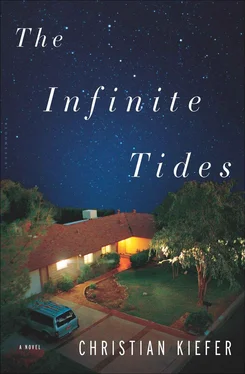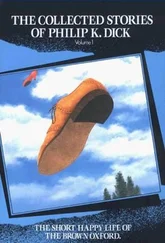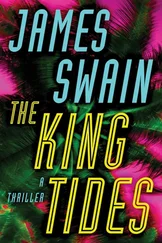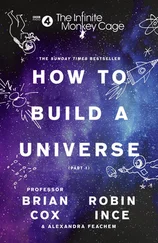The figure had been walking toward the end of the cul-de-sac and it stopped now. “That work?” A man’s voice.
Keith looked up. The face was mostly obscured in shadow. “No,” he said. Then he added, “I just dropped it down the stairs.”
“Maybe they can fix?” the man said.
There was a trace of an accent and the man’s face looked vaguely familiar, although Keith could not place it. “I doubt it,” Keith said. Then he added, “Have we met?”
The man looked at him and his white teeth shone in a broad grin. “You are famous astronaut Keith Corcoran,” he said. “I meet you at Starbucks.”
“Starbucks?” Keith said. There was a moment of silence and then he realized that it was the loud Ukrainian man. Fantastic.
“Peter Kovalenko,” the man said. He extended his hand and Keith took it and said his own name but did not rise, noticing for the first time what the man was carrying. It was a white telescope, a relatively large one with its tripod gripped under the man’s left arm and the telescope itself riding up across his shoulder and pointing skyward above his head.
“Yes, I know this,” Peter said, still smiling. “You live here?”
He thought briefly of telling a lie or at least a half-truth but instead he merely gestured vaguely behind him toward the empty house. “Yeah, here,” he said. He tried to relax his wrinkled brow and his tight, squinting eyes in the cool night air but it was difficult to do so.
“Amazing. We are neighbors, then,” Peter said. “My wife and the children are there.” He gestured similarly over his shoulder toward the main road that led, eventually, out of the cul-de-sac maze. “Very exciting. My neighbor is famous astronaut.”
Keith nodded. “Very exciting,” he said. It was quiet then but for the crickets and the constant hiss of distant freeway traffic. The sidewalk seemed to drift beneath him. So slowly.
“You are between space missions maybe?” Peter said.
“I don’t know.”
“You don’t know? What is meaning?”
Keith looked up at him. “It means I don’t know,” he said.
Peter looked back but said nothing. The smile did not falter. After a moment he said, “Less light here.” He gestured down the street to the end of the cul-de-sac and the empty lot that lay now in blue-black darkness. Keith did not answer. “For telescope,” Peter said after a time.
Keith nodded. He had caught his breath but still did not stand. Gravity seemed tilted slightly. How many beers had he consumed? He could not recall. Everything felt distant. The feeling was exactly the opposite of being in the microgravity orbit of the space station and he wished more than ever before that he was back there, right now. In the illogic of his current state he imagined pushing himself through the air and back inside, back into his bed.
“Maybe they can fix,” Peter said, gesturing at the television.
“No,” Keith said. “I dropped it down the stairs. It’s history.”
“Too bad.”
Again, a pause in the conversation, this one long enough to feel awkward and Keith was just ready to stand and return to the house when Peter said, “I’m pleased to meet famous astronaut.”
“Thanks,” Keith said, and there was bitterness in his voice that he could not disguise. “Good to meet you too.”
Peter smiled broadly. “Famous astronaut is my neighbor. I am lucky man,” he said.
“Look, I’m sorry,” Keith said abruptly. “I’m beat.”
“Of course,” Peter said. He extended his hand and Keith shook it again as he tried to stand. He stumbled a bit and Peter put a hand on his upper arm to steady him as he rose to his feet.
“OK,” Keith said. “I’m OK.”
“Yes, yes,” Peter said.
“I’m going in,” Keith said but he made no move toward his door.
After a long moment Peter said, “I am glad to meet you.” There was a quizzical, puzzled look on his face. “Good night,” he said. “Sorry about this television.”
“Yeah, thanks,” Keith said. He thought he should have probably taken the opportunity to tell him then that he was not an astronaut, that he had only been joking, but he would not do so, not even now. It was true and that meant it was true for everyone and that included this man and Jim Mullins and Eriksson and everyone. He was an astronaut. Fact.
“Good night to you,” Peter said. He did a little bow and Keith nodded and then Peter swiveled slightly on his heel and moved past him and into the darkness of the field beyond. There was a chain across the entrance — assumedly to keep people from driving into the field — and Keith watched Peter step over it and stump off into the night darkness. Keith found himself wondering if whatever that great dark bird had been feeding on was still present in the field. Some desiccated tangle of bone and sinew.
For a long time he was still and alone. Again he felt like lifting the television and smashing it to the concrete. But instead he turned woozily toward the empty house and opened the door and stepped into the dull flat light of the drifting entryway.
( c Δ t ) 2> (Δ r ) 2
(Δ s ) 2< 0
She was atop the slide, smiling, the other children swarming the playground equipment around her, periodically peeling away to charge across the grass and asphalt to their waiting parents. Keith stood amongst them but he did not call out her name, not yet, instead standing and watching her as she shot down the polished metal slide and turned, trailed by two or three other children, apparently her friends, and clambered to the top once again, sliding down, then giving up on the slide altogether to begin running around the playground equipment. The children were playing tag or something like it, and he could hear the high-pitched screeches and laughter even from across the grass and asphalt, all the way to the edge of the parking lot. His daughter’s laughter. The laughter of her second-grade friends. And yet each time she moved too far away from them or they from her he could feel his heart seize in his chest, the moment in which she was alone there on the playground stretching out before him, time no arrow but a wobbling series of loops like yarn sprung loose of its bundle. But the children she was playing with returned to her again and again, and even as one and then two of them were called away by their parents, they would be replaced by others and he came to realize that she was not joining their game, that they were joining hers, that she was the center of their play, an idea that he found so surprising and which he embraced with a sense of relief that very nearly brought him to tears.
She did not see him until there were no longer enough children remaining for the game to keep going. It was only then that she glanced toward the parking lot and saw him there, the other parents mostly gone now, a few continuing to arrive.
She waved toward the playground, one or two children returning the gesture, and then sprinted up the hill toward him, her face a bright smile and her tiny backpack flapping behind her like a weird single wing.
“Hi, Daddy,” she said when she had arrived at his side.
“Quinny Quinn Quinn,” he said.
“Where’s Mom?”
“She had to go out so I told her I’d pick you up.”
“Where’d she go?”
“Grandpa’s sick so she went to see him.”
“Sick how?”
“He has cancer.”
“What’s that mean?”
“It means he’s really sick,” he said. He was looking at her, at her tiny self, her tiny being. “Do you have all your stuff?”
“Yeah, let’s go,” she said.
“OK, bossy pants,” he said.
In the car, she asked him again how sick her grandfather was and he told her, bluntly and without preamble, that it was likely he would die. He had not even speculated what her response would be because he had not thought his way through the conversation they would have. Barb’s father had already gone through a full cycle of chemotherapy treatments the previous year, but two months ago it had been revealed that the cancer had returned and had spread throughout his body. He had deteriorated rapidly, and when Barb’s mother had called to tell her daughter that her father was in hospice she had booked the first available flight and called Keith at work to tell him that it was time. He bundled a thick sheaf of papers into his bookbag and returned home in time to drive her to the airport. She had not spoken in the car, clutching his hand and staring forward out the windshield, and when they arrived at the airport she did not release her grip for some minutes, continuing to stare straight ahead as various travelers crossed and recrossed the walkway before them. He did not say anything to her then, turning from her face to the windshield and there they remained until at last she broke the silence by telling him that she had left a list with Quinn’s schedule and that there were some things in the freezer he could reheat for dinners. He told her he would be fine. She would call him from Atlanta when she knew more. He told her he loved her and she did the same.
Читать дальше












